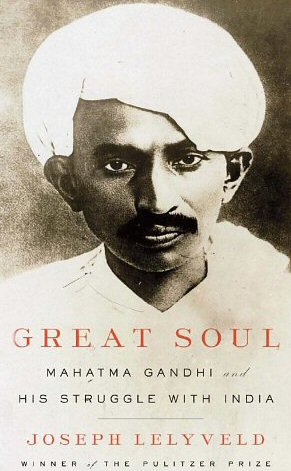I believe in walking alone. I came alone in this world, I have walked alone in the valley of the shadow of death, and I shall quit alone, when the time comes.
– Mohandas Gandhi, echoing words from a song by the poet Rabindranath Tagore, quoted in Great Soul by Joseph Lelyveld p.7
By now, even the dumbest of our many readers must surely have heard of the new biography on Gandhi with its suggestion that the Mahatma was an AC/DC.
The book by Pulitzer Prize winner and former Executive Editor of the New York Times Joseph Lelyveld has already raised the hackles of many Indians, who, with little else to do, are in any case forever desperately scrounging for an opportunity to have their hackles raised.
Great Soul has created such a ruckus in India that the book has already been banned in some Indian states like Gujarat.
Over the course of the next 10 days or so, we’ll take a dekko at each of the dozen chapters in the book. And then we’ll end with a summary.

Now it’s time for Chapter 1:
Sorry to disappoint y’all but there’s nothing in the first chapter about Gandhi’s childhood, his parents, family, friends, school days, London days, his marriage or the setting of his birth-place Porbandar.
Zilch. Nada. Zip.
Instead, our first glimpse of Mohandas Gandhi is in South Africa, where he arrives a few months short of his 24th birthday.
Gandhi arrived in South Africa on May 22, 1893 and left in 1914.
Lelyveld makes clear in the author’s note that precedes Chapter 1 that his work “isn’t intended to be a retelling of the standard Gandhi narrative.” His narrative framework is Gandhi as a social reformer and his social vision.
This chapter doesn’t contain much that’s juicy or titillating. Instead, it mostly provides a brief summary of Gandhi’s South African days.
Gandhi came to South Africa as a law clerk to assist in the resolution of a legal dispute between two Muslim traders of Indian origin.
Playing Pocket Billiards?
One of the interesting discoveries we make about Gandhi in this chapter is that of the 21 years he spent in South Africa only nine years were in the same household with his wife and children.
That’s certainly interesting. So, before he took his vow of celibacy (in South Africa) was Gandhi jerking off under the covers or buggering his friend Hermann Kallenbach or neither? It’s unlikely we’ll ever know the definitive answer to that question.
Another interesting tidbit from this chapter is that the honorific Mahatma or Great Soul was bestowed upon Gandhi by the Bengali poet and Nobel laureate Rabindranath Tagore.
Lelyveld also touches upon speculation that Gandhi toyed with the idea of converting to Christianity, a point that the Great Soul always denied later.
The chapter, of course, mentions Gandhi’s early run-ins with the racist Whites, particularly the well-known incident when he was ejected from the First Class coach at the Pietermaritzburg train station and the lesser known incident in the court room where he’s asked to remove his turban but refuses.
We also get a sense of Gandhi as a vain egotist when we learn that he purchased the entire first edition of his first biography (by Joseph Doke) to distribute to various people in South Africa and India (p.19).
Tamils will be heartened to know that their brethren constituted Gandhi’s loyal group of supporters in South Africa.
An important lesson we learn from Gandhi’s experience in serving the British cause during the Boer War and coming a cropper on the demands of the Indians in South Africa is that supplication or toadying before the powerful yields not the desired results despite your prostration at their feet.
On the whole, Chapter 1 is nothing more than what the author accurately describes as the Prologue.
So, folks stay tuned. The juicy bits are yet to cum.
Related Stories:
Great Soul by Joseph Lelyveld – Chapter 3; Before he Became Mahatma, Gandhi was a Racist Swine
Great Soul by Joseph Lelyveld – Chapter 2
OMG, Was Gandhi an AC/DC?


The title is perfect for him.
Looking forward to an unbiased review.
SearchIndia.com Responds:
SI is always unbiased. Our claim to infamy.
food for thought
probably you have seen it already
http://www.youtube.com/watch?v=M_3T-Af57Pg&feature=related
http://www.youtube.com/watch?v=LyePCRkq620&feature=share
SearchIndia.com Responds:
Nice videos. Hadn’t seen them before.
Get back to Gandhi’s model of rural self-sufficient economies.
A mention of this was made in Lage Raho Munna Bhai, as were some other interesting pieces like the name of the Ashram in South Africa (Tolstoy Farm).
SearchIndia.com Responds:
Lage Raho Munna Bhai, eh?
We’re still having a hard time comprehending how that crap-show turned out to be a big hit. Apparently, it was remade in some South Indian languages as well. Or at least, there was some talk of dubbing or remaking it. One of those Only in Incredible India things.:(